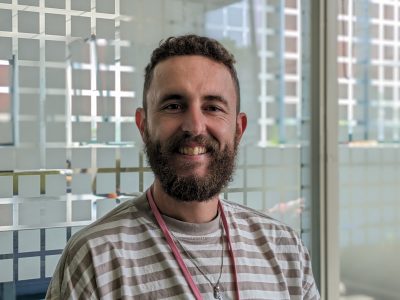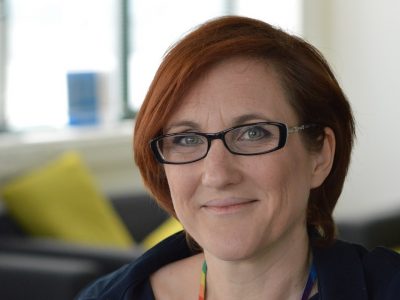What does a Memory Support Worker do?
Lesley: It’s a relationship-based role. We’ve moved from a model where we gave standard appointments and the same information to everyone to a much more personal approach. We can adapt what we do, depending what that person might need. For some people it might be hardly anything and some people we might make a phone call to and discover that they are really in crisis and we are able to help with that.
Tiffeny: Our role starts with first contact as soon as people come into the service. That’s a phone call to try and understand what kind of changes or problems they’ve noticed with their memory and what we can do to help them. We give people support as soon as they come into the service – regardless of diagnosis.
Louisa: We’re the first person that patients will speak to after they’ve been referred by their GP or another medical professional. They could be very well supported in their life, or they could be quite isolated and not really managing very well with their day to day activities, or feeling lonely. Their memory might not be their biggest worry – other things could be concerning them like not being able to get out of the house any more. Or perhaps they just need someone on the end of the phone to talk to.
Tiffeny: After the assessment process, anyone who then receives a diagnosis of dementia is offered support from one of us, usually for the next year. We meet with people soon after their diagnosis and follow up with them throughout the year. The first appointment is really to help people understand and come to terms with their diagnosis, and for us to give information and advice which we write into a care plan. People can contact us whenever they need to throughout the year and we can arrange to meet them again if they want that.
How has your role changed or developed since the service has been redesigned?
Tiffeny: It used to be that we would only get in touch with people after they received a diagnosis – so those who were not diagnosed would receive no support from us at all. We would have the initial appointment after diagnosis and two follow-ups, usually over the telephone. Now we contact people as soon as they come into the service. We can arrange to meet them before their assessment if that’s going to be beneficial for them. If, for example they can’t hear well or struggle to speak on the phone, we can go and meet with them which also gives us a better understanding of their home environment.
Lesley: Now we are supporting people right through the process of coming to a memory assessment and we’re focusing our support on whatever it might be that the person needs. It might be all about their memory and their dementia or it might be about social isolation or practical things.
What happens when you make ‘first contact’ with someone who has been referred to the service?
Tiffeny: People are sent a letter to say that we’ve received their referral and that one of us will be in touch shortly. It also explains what the service is about. Ideally we make that first contact call within a week of receiving their referral. We have 30-minute slots for the calls, but it really varies. Some first contact calls last 15 minutes and some will last for an hour and a half. Sometimes the patient or a family member is just grateful to have someone listening to them.
Louisa: You could be the only person that’s spoken to them all day or all week.
Lesley: We have time to have a bit of a softer conversation with them – we’re not just ringing up to make an appointment with them, we’re ringing up to genuinely see how the person is.
Louisa: It’s important to protect that first contact time and ensure that those conversations don’t feel rushed or that we’re ticking a box. We feel it’s important to connect with people on a human level and look at things holistically and be guided by the individuals. That can be difficult when you’re working in a busy NHS service, but I think we manage to preserve that quality of interaction well so people do feel that they can have that space to talk.
Tiffeny: We try to ask people: “Is there anything that you want to be doing that would improve things in your life?” and quite often they say: “Just talking to you has made such a difference.” At first the first contact was really difficult – we’ve come a long way with that, learning how to let the person lead us.
Why is this first interaction with people important?
Lesley: I think we’ve all become quite skilled at using first contact to pick up the signals when people are really struggling. We can tune into that over the phone and then respond to that straight away. Sometimes we’re making contact with people who have probably got dementia but haven’t been aware of it, haven’t sought any help with it and are not coping. If we can reach people earlier, and in a way that people will accept and not find threatening, we can nip those situations in the bud. We can build up a rapport with the person and involve other services so people aren’t just struggling alone and not known to anyone. We’re trying to make sure that people don’t fall through the cracks. Also people can be feeling scared – imagine getting a letter saying you’ve got to come and have your memory assessed.
Tiffeny: And the letter says that this might result in a diagnosis of dementia – for some people that’s never crossed their mind.
Louisa: Yeah, it’s a huge, life changing outcome. A big part of the initial contact is talking people through the process and answering any questions about it – what would happen if the doctors did find something significant. People have questions about what they can be doing to make their memory better, and whether there is any treatment. And we talk to people about things they can do to keep themselves socially and cognitively stimulated in the day to day things that they do in their lives.
We also talk to people about other causes of memory loss and explain that a diagnosis of dementia isn’t the only possible outcome. Memory loss can come from lack of sleep, anxiety, stress, other big significant traumatic life events like bereavement or an infection.
Tiffeny: This is another good thing about first contact – we can find out if MAS is actually the right service for people and whether it’s the right time for an assessment. It used to be that people were referred to us and the first contact they had was from our administration team calling to book an appointment, but for some people that’s just not appropriate. Say if we call someone and they tell us they are just recovering from stay in hospital, or currently have an infection, or are experiencing anxiety or depression – these are all things that could impact their memory and cognition. It might be that we need to wait a while before doing the assessment, as doing it now wouldn’t give us a clear picture. We don’t want to waste patient’s time or put them through unnecessary assessments if there’s a better time to do it or another team better suited for them.
Who are you typically making contact with?
Louisa: Predominantly we work with the person with the memory problem or a diagnosis of dementia. But we also try to speak to a family member or carer to get their input and find out if they need support. We can signpost carers on to our partners at the Carer’s Centre who offer lots of support to family or friends or anyone who is supporting a loved one. And there doesn’t have to have the diagnosis of dementia in order to get that support. We do make quite a lot of carer’s referrals at first contact.
We hear a lot about isolation and loneliness – do you have a sense of how your work is helping people to be less isolated and lonely?
Louisa: It’s been really eye-opening – realising just how many isolated and lonely people there are in the county.
Tiffeny: People are usually offered our support for a year after diagnosis, but there have been some cases where if we stop seeing this person then they’ve got no one else at all, so we need to make sure they’re involved with other services before we end our support. There are people we work with who have no family and don’t want to engage with social services but they will engage with us – sometimes we’re the only people that they are willing to see. We have been able to build up the trust and gradually talk to people about accepting other things.
Louisa: There was one lady who I had seen initially for a new care plan appointment. She called us a couple of months later in a highly anxious state and was refusing to let her carers in and because of this she was missing doses of important medication. She lived alone and she was struggling to support herself with day to day tasks. She had also begun to hallucinate and was finding this quite distressing. At the time she told me she wouldn’t let anyone else into her house. I spoke to her on the phone and she agreed to let me in where I spent time talking to her and reassuring her. By calling us and engaging with our support we were able to refer her for more specialist mental health support before she reached crisis point.
Lesley: I’ve worked with a couple of women who had no other support, been very isolated, no services, no family. So our service – which to start with boils down to me – is the only person having any contact with them. I’ve been able to keep visiting over a period of time and build up a rapport where they would accept help from other specialist services which they really needed. In actual fact both have now moved into residential care, but in both cases there was a risk of hospital admission, a risk of greater deterioration of their mental and physical health and it both cases that didn’t happen. They were linked in to the right service at the right time before a crisis hit. And I was able to make that introduction and make it a bit less frightening.
Tiffeny: One gentleman I worked with kept missing appointments as he was forgetting about them and had no support at home. I started working with him straight after the first contact and helped him get to all of his appointments including one where he was given a diagnosis of dementia. The main thing he has wanted for the last five years is to move house, but he had no support in doing this. I’ve helped him apply for a flat in a new, extra care housing scheme for people with dementia which he has been accepted into. It was quite a simple process but he just needed a bit of support with it and now he’s achieved the thing that was most important to him. There must be so many people out there that don’t have anyone, so it’s great that we can be that person for some people.
What is your sense of the role that peer support groups are playing in supporting people?
Louisa: We have two groups that meet on the same day at the same time in the same venue. There’s a group for people who have received a diagnosis of dementia from MAS within the last year, and a group for any loved ones or carers who are supporting them. We’ve had really consistent attendance at the groups – they are drop-in and it’s flexible.
From the feedback people have given us they’ve found it’s made a real difference. Just connecting with other people who are in the same situation. People who can understand what they are going through – whether that’s a carer or a person with dementia.
Tiffeny: It’s the only group for peer support for people with dementia. All the other support groups in the city are for carers. And those can sometimes not be very well attended because the carers don’t want to leave the person they’re caring for. So we think this is why our group is so well attended – they can come together.
Lesley: Some of the other groups that are available for people with a diagnosis of dementia – there are some fantastic things for people but they are quite activity focused. That’s great for wellbeing, and exercise and stimulation. But in terms of a space to just talk if you want to about your diagnosis – which is this huge, transformational thing – really this is the only place to do that.
Louisa: The groups are full of hope and humour. It’s amazing to see how resilient people are and what positivity they have in the face of a potentially life changing diagnosis.
Find out more about MAS
tagged in Brighton and Hove Memory Assessment Services, innovation, person-centred care, service redesign
No Comments
You may also like

10.01.2024 | by Jo Parker
Working Here: Jamie's story

16.11.2023 | by Rich Taunt
Rebel alliance: The ever greater need for social enterprise

06.01.2023 | by Helen Curr
Dementia care: What if...

